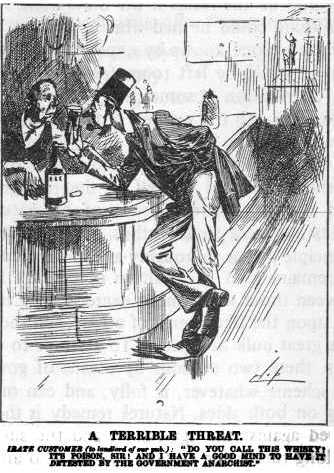Every man has, by virtue of his existence, a natural right to utilise the face of the earth to satisfy his requirements, without restriction by or any payment to any person or institution.
The principle of the Single-Tax and the Leasing System are therefore as much opposed to the principle of human liberty as is the system of landed proprietorship.
For the Government to 'supersede the capitalists by performing the functions of producer' is a mis-statement. The working classes alone can perform those functions; and capitalists or governments can only intervene to perform the function of exploiters of, or interferers with, the producers. To be robbed by the State is as bad as to be robbed by anyone else, and worse in one way, because better terms can often be forced from private capitalists in detail, whereas, although the State may oppress unequally, it is impossible to combat the government except by revolution, excepting in trifling matters where they may give way to avoid trouble. For example, the public have never yet got anything from the government as against the privileges of capital, except where the great capitalists saw their opportunity to crush down the small ones, without at least the threat of a revolution. The possession of power is an opportunity for capitalistic juggling to its possessor, and the interests of those who govern are necessarily opposed, in general, to the interests of the governed. Again, what would be the result if the State controlled production? Either nothing could be had which it did not cause to be produced - and everyone knows by experience what that would mean - or there would be left room for capitalistic control of production or distribution in some things in point of which the power to exploit and rob the workers would be increased by the comparative monopoly.
Everyone having the right by nature to use not only the earth but all that therein is, and himself in that category, for the satisfaction of all the inherent needs of his nature, without restriction by or payment to any other, government stands condemned in principle just as thoroughly as capitalism does, and the obvious fact remains that a condition of conflict is inevitably necessary between those who cannot exercise their natures without infringing upon the like liberty of others, and those who can, who form the great bulk of society. To attempt to enforce harmony between these two sections by means of government or any universal scheme whatever, is folly, and can only result in more suffering on both sides. Nature's remedy is the revolution of the aggrieved against the aggressors, and the survival of the fittest, in the long run, being certainly those who are competent to live and enjoy life in the fullest and highest manner, without having, for that purpose, to oppress and to incur the resentment of their fellows.
We hold therefore with the simple abolition of all proprietorship and authority, and the consequent establishment of absolute individual freedom; if you are in earnest for humanity, consider in the first place, whether, if there were no payments, no proprietorship, but everyone did whatever he might choose to do for another, gratuitously, it would not lead to everyone doing precisely as he actually liked, and at the same time place so many opportunities within the reach of everyone to get all that he wanted without occasioning injury or hardship to anyone else, as to effectually remove the sole pretext which government can plead as a moral reason for its existence - the supposed need of a power to keep equity between man and man? Consider, in the second place, the degradation of obedience to any power that claims your submission, and the danger which that power becomes to its subjects, in the hands of the crafty and the unscrupulous, who have always the largest incentive to become possessed of such a potent tool. And then throw away the vain illusions of political reform, whether taxism, land nationalisation, or National or State Socialism; and declare openly and vigorously for ANARCHY.

'Bulletin', February 15, 1890, p8.